The Man Behind The Mask: Q&A With David Lloyd, “V For Vendetta” Artist And Creator Of The Guy Fawkes Mask Embraced By Anonymous And Protestors Worldwide
What unifies protesters around the world, from Occupy Wall Street to the streets of Istanbul? It might be a desire for change, for greater freedom, or frustration with the powers that be. The Turkish prime minister blames social media. But the common denominator seen in images of protest from New York to Bangkok to the Middle East is that of a grinning white mask, with rosy cheeks and an upturned mustache.
According to its creator, David Lloyd, the mask began by "accident" in a comic strip in England in 1982 known as "V For Vendetta." It began as an ongoing black and white strip in "Warrior," a British comic anthology that was canceled in 1985, before the "V For Vendetta" story had ended. The comic was picked up by DC Comics, who reprinted the series in 1988 in color. This allowed creators Alan Moore and David Lloyd to finish the story.
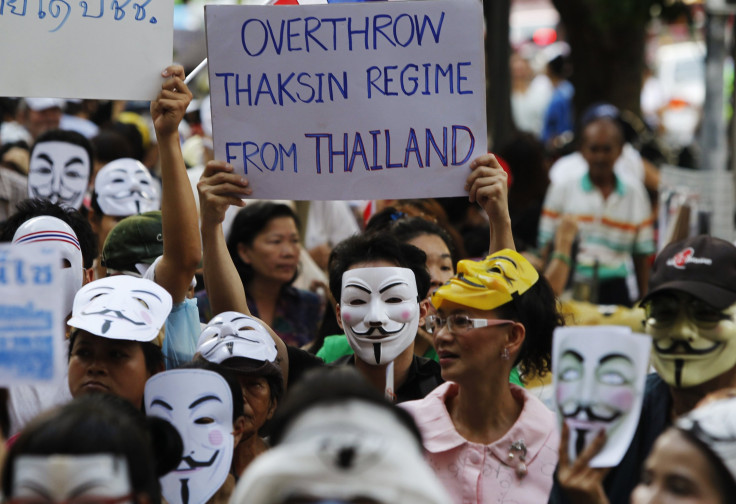
In "V For Vendetta," the main character is known only as V. He lives in an post-nuclear wasteland where a totalitarian British government watches and listens to citizens' every move. V breaks out of a "resettlement camp," where undesirable members of society such as homosexuals and non-whites are subject to medical experiments. Donning a stylized version of a Guy Fawkes mask and costume, V takes revenge, brings down the government, and teaches his fellow citizens to rule themselves.
When comic book properties became a hot commodity years later, Hollywood's interest was controversially piqued in writer Alan Moore. A film adaptation of "V For Vendetta" was released in 2006 starring Natalie Portman and Hugo Weaving as V. The adaptation, directed by the Wachowski brothers, is often credited for igniting interest in the mask, which was first widely used by Anonymous in a protest against the Church of Scientology.
What follows is an edited transcript of an interview held last week, with artist David Lloyd.
Alan Moore wrote that you originally told him your idea about Guy Fawkes as the visual representation of V in a letter. Were you working long distance at the time?
We were sort of hemming and hawing about what the nature of V when I sent the letter.
The way everybody knows each other in the business is that they are freelance artists. It's not like the old days where you had artists and writers working in the bullpen of Marvel or something. They just send their work in.
Alan lived in Northampton. I was living near Roxford at the time. We met each other at conventions, we met each other before. It was the first work we actually collaborated on, and we clicked. We both were influenced by the same kinds of books, movies, TV.
We had similar attitudes on politics too, Alan was a bit more off-the-wall than me. We had similar attitudes and they clicked together and we worked very well together, and that’s the heart of “V for Vendetta.”
How many attempts did it take you to get to the final design of the costume and the mask?
Once you have the idea of having a resurrected Guy Fawkes as a character (or the character himself adopting the persona of Guy Fawkes), well, you just go back to 1605 and see what Guy Fawkes wore. Then you just reduce that.
The idea of the mask, you copy what you knew, or what was known about what Guy Fawkes looks like, and produce a stylized version of his face. It was also based around what you knew of the Guy Fawkes masks that were commonly used in the festivals that we used to have every November the 5th, in which we burned an effigy of Guy Fawkes as this terrible terrorist who dared to destroy the monarchy in 1605, with a bunch of fellow conspirators.
That was a traditional British holiday that we celebrated. And every November the 5th we let off Guy Fawkes in celebration of this execution, and also adorned an effigy of Guy Fawkes made of straw and old clothes with a mask that represented the character. And you could buy those in the same stores that would sell the fireworks around November the 5th.
The problem was that we created “V For Vendetta” in the summer, and I could not find a Guy Fawkes mask anywhere. The original plan was to actually use the kind of Guy Fawkes that you could buy in the store, but I couldn’t get one. So basically, I just had to redesign the concept, and that’s how I ended up with that stylized version of Guy Fawke’s features.
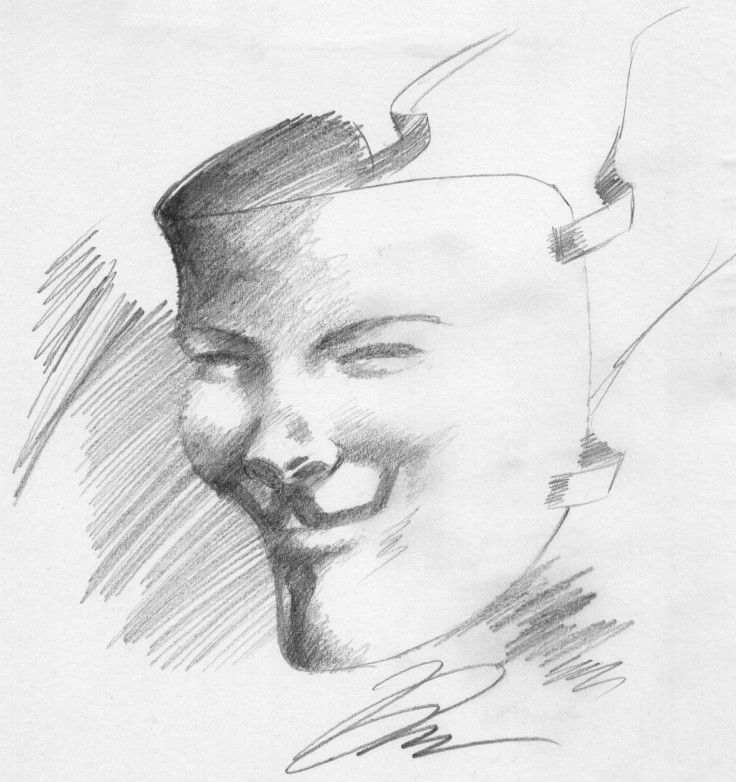
Did the masks that were traditionally used look like the V mask?
In fact, the mask, or the smile is actually a kind of accident, really. The smile in the face of V is kind of an accident because I only had a memory of what the Guy Fawkes mask looked like, it may be very crude.
But I remembered the mustache, and I kind of had a memory that the mustache suggested a smile, and there was a smile. So I actually included the smile on the mask. And of course the smile turned out to be a great accident because it has all those resonances -- "smile in the face of adversity, smile even though your heart is breaking, smile in the face of the tiger" --all of those fantastic resonances that gave more nuance to the whole.
I had read that the face might be based on an actor. Was it?
No, It’s not designed based on any actor at all.
How did you get involved with Occupy Comics?
I was asked to contribute. There were two strands of Occupy Comics, but my initial experience was through John Kim and Terry Marshall, who were actively supporting the Occupy movement in New York. They asked me if I would submit something, and I told them I would be happy to.
I think the Occupy movement is absolutely fantastic, in my opinion it’s probably one of the most important people’s movements of the 21st century, and the 20th century. The trouble is that nobody really wants to support what they represent. They are too "grassroots" for their own good.
The trouble with politics these days is that you have to be part of a party. You can’t just be people; you may represent the 99 percent against the 1 percent whole of power, but that doesn’t mean anything. You’ve got to be part of a group. The Occupy movement has purity of its ideals, which means its going to be difficult for them to work with anyone.
But it’s a fantastic movement, and when I was in New York, I went down to see them, when they were herded into that park, and I was really impressed. It was really organized, it was none of that stupid propaganda that filled the papers at the time -- drugs, and stuff like that. That was just typical propaganda. I thought it was fantastic.
But, of course, powerful interests don’t like people causing trouble for them in their ivory towers and we know what’s happened there. It’s evaporated [in the U.S. and the U.K.] but elsewhere it’s still going strong, and it’s still got a strong base. I’m very glad that protesters adopt that mask of V so evidently in the implementation of what they believe in. I think it’s great.
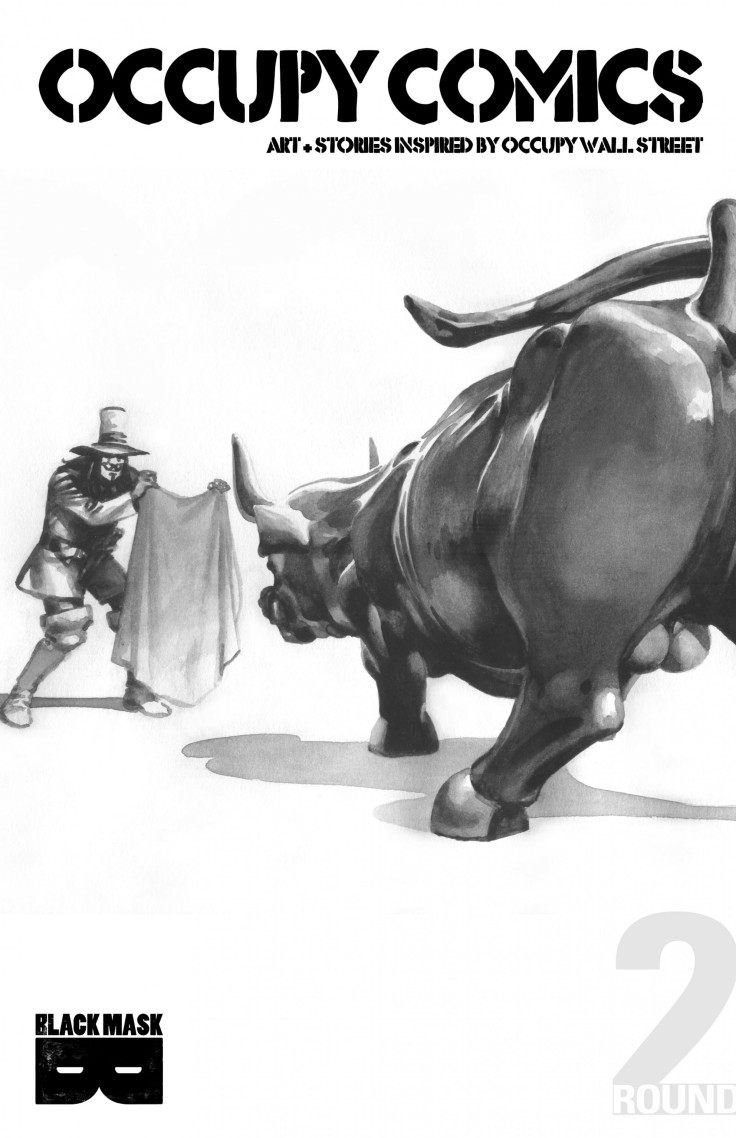
How do you feel about all the different groups that use the mask?
They all have different agendas, it seems to me. The Occupy movement has a different agenda to Anonymous. I don’t know whether you can link them.
The important thing about that mask is that it’s used on a widespread level by many people who just want to use it as an all-purpose symbol of resistance to tyranny, even of perceived tyranny. That’s the most important thing about that mask. That’s why it’s been used in so many disparate groups. It’s been used in anti-Scientology demonstrations, also used by Occupy Wall Street Movement, also used by protesters in Egypt and in China.
It has been banned in Bahrain and about to be banned in Saudi Arabia, which really shows the power of something. What in fact it does is represent people’s need for freedom. The idea of banning a mask -- if you think banning a mask is going to stop people from wanting freedom, you’re crazy. But that’s how governments are, they’re often incredibly stupid in their assumptions.
It reminds me of how in Turkey and elsewhere they are blaming the social media as the instigator of the problems, as opposed to issues within the governing bodies.
Well, there is some sense to that, because if you close down communications, you are actually closing down the means of communications of anybody who wants to resist or disagree with the way things are. But banning a mask, that’s like banning paper, isn’t it?
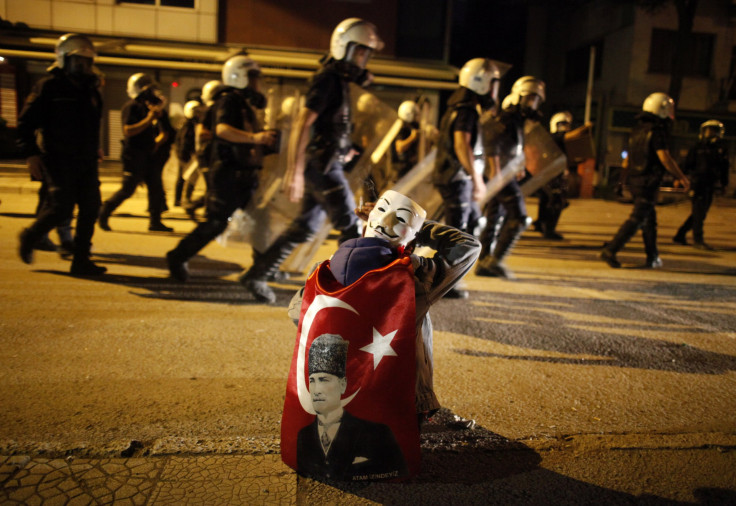
How does it make you feel to be the creator of that image, verbatim, which has become so important for people?
I think it’s great. The way I look at it is that once you create a piece of art, and it’s out in the world, there’s nothing you can do about it. People can use it the way they want to. There’s nothing you can do about it. All you can hope for is that people that are using it are using it with the best intent.
All examples that I’ve seen of the V mask have been used with the best intent. It’s been used by people who are expressing frustration, anger. The reason why I think it can be used on such a widespread basis, is that it has no political baggage behind it. The closest thing to it, in recent times, was the image of Che Guevara, in the ‘60’s and ‘70’s as the spirit of revolution.
But Che Guevara was a Marxist, and V (as represented in “Vendetta”) only really represents freedom -- freedom from tyranny and the ultimate freedom of anarchy.
So it has that purity behind it, and not any real political baggage behind it that goes back to any discredited political philosophy, just a pure desire to escape tyranny. That is why everybody can use it to represent freedom. You know, nobody can point to that mask and say, "Hey, that represents this, and that means that you are this." It only means that you are somebody that doesn’t want to be run by an authoritarian government. That is most of us, and that’s why that’s so fantastic a symbol.
In a BBC article you were interviewed for, a comic book expert said that there was a threat of violence behind the mask, since [spoiler alert] V blows up parliament at the end. How does that make you feel?
When people are quoted, in any journal, whether it be as honorable as the BBC or not, you never really know what they said in the first place. What he may have said at the time, was that people get frustrated and anger leads to violence.
Of course that is absolutely true, and there is no way that I’m going to say that the “V for Vendetta” mask stands for peaceful demonstration, because that would be ridiculous.
What happens in any political resistance is that frustration can sometimes boil over into anger from those demonstrators. Largely, if you look of the history of demonstration, it is usually stimulated by the police or whoever is actually trying to control these demonstrations, who are usually heavy-handed, who are usually given instruction by the government in charge that they want to stop it very quickly, and with the least impact on the public and the cameras of the media.
So, usually, any peaceful demonstration is usually exacerbated by the actions of the police, or whoever is in charge.
But let’s face it, we don’t live in a perfect world. If any demonstration that involves the use of the mask, of V, spills over into violence, well that’s just the way of the world, and I just hope for the best, not the worst.
You have had some time to contemplate on the mask out in the world.
The mask, really, the more questions I get asked about this, the more I see that there is a desire for freedom that is constantly happening in the world, and that mask has come to represent that. And let’s face it, that’s what we all want. I don’t want to drone on, but even in democracies; the Occupy movement happened in a democracy. When I was in Zuccotti Park, I saw the freedom of speech being denied to those people. They had speakers, and the police would not allow loud-hailers [megaphones], so what the speaker said had to be relayed to somebody who could hear it, and then they relayed it so that other people could hear it.
That’s a disgrace, that’s a denial of freedom of speech. And this is in a democracy! We are living in a very strange world now, where even in a democracy, the people that run the show you actually can’t vote for. The people you vote for, they haven’t got any power. Even in a democracy, we are denied that freedom, which that mask has come to represent as a desired object.
Did you see in the Middle East and elsewhere, protesters are making their own copies of the mask. Anonymous has issued ways for people to make their own mask. Street vendors in Turkey have the mask laid out for distribution...
They’re making their own. Aren’t they?
Yes, it looks like it. They don’t look officially licensed. How do you feel about that?
I have no objections at all, I think it’s fantastic. It’s fascinating.
Mr. Moore also did work for Occupy Comics. Was that your doing?
No, absolutely not, in fact, in the publicity of Occupy Comics, there was a lot of misunderstanding. A lot of people were saying Alan Moore and David Lloyd were working together on this. Occupy Comics is reprinting stuff that I did, and I think they are reprinting work that Alan did. It had nothing to do with me.
Alan is just a great guy who believes in freedom of expression, in exactly the same way I do, so I was not surprised that he wanted to help on that project.
Hearing you speak about it, reminds me of other great collaborations. It sounds like Paul McCartney speaking about working with John Lennon. But you haven’t done any work with Mr. Moore since. Why now?
That is really Alan, because Alan likes to explore. He is a very creative person, and he had this idea that he could go from artist to artist using their different strengths. I believe that I dip into my toolbox, if I can describe it as that, to use different styles for different subjects.
So I don’t think its necessary to isolate a particular artist for a particular strength, but that’s what Alan did. He took advantage of his very hard-fought-for success. He became very popular at DC Comics doing a superb rework of a comic series called "Swamp Thing," which he did something revolutionary with. Then he could do anything he wanted to after that. He showed how fantastically skillful he was. And then he went off and worked with great people like Eddie Campbell [on “From Hell”]. You know, he was free to work with anybody, so there was no real reason he had to continue working with me on anything.
But we did do something great with V and we were on the same wavelength with “V For Vendetta.” As I say, we both influenced by the same sort of political sympathies at the time, you know, raised on the same TV, movies and books, and we clicked.
The one important thing about “V For Vendetta,” and the key to its success was it was the very first strip we had the freedom to do whatever we liked. Before that, we worked in the mainstream industry where it was “work for hire,” this was the first thing we were able to have freedom with, and that’s why it was so good.
Freedom led to a story that is about freedom, and ultimately a symbol of freedom. And that is the key. If you give creators freedom to tell the story they want to, like giving artists a paintbrush and a canvas and saying "Off you go," you get great results.
If you ask them to keep on drawing the same old characters that have been franchised and reworked and kicked around for decades, then their enthusiasm is not so hot. That’s the key, that’s the key to great creativity, and great involvement and passion, is freedom.
When you visited Zuccotti Park, was that the beginning of your involvement with the Occupy movement?
I guess, I’d known about it and I think I had been asked to contribute something before that, and I had known about [the] Occupy movement before that, but I can’t say that the visit to the park stimulated a great interest, but it really confirmed what I assumed and suspected to be the case: that it was an honorable operation, and worth supporting.
What interactions have you had with movements like Occupy movement and Anonymous that use the mask? Have any of them reached out to you?
Apart from those guys in New York, and the editors and supporters of the Occupy Comics movement, and at conventions, I was at a panel in San Diego about Occupy, and I visited one of the Occupy movements that was happening to in France at the time, merely to sort of say ‘hello’ and see what they were doing.
I’m glad that they use that symbol that I’ve managed to create, and I support the Occupy movement entirely, I think it’s a wonderful cause. I would respond to any request for support that came my way, but I don’t go out of my way.
In Thailand, protesters organized a White Mask Group to protest the government, and counter-protesters came wearing a red mask to support the monarchy. What do you think about derivatives of the mask like these?
Well, often times red represents communism, so it's kind of ironic that they would use a red mask. It’s kind of strange, but the bottom line, is that everyone is just protesting against authoritarianism. Monarchy is totally outdated, unless it's like what we have in England, where it represents a symbol (they have actually no real political power) but any one-party state, anybody who governs because they think they’ve got enough power to govern, well, that’s all wrong. We all know that.
The NSA’s PRISM program has become a big scandal in media here. First it came out that the American government was collecting information about millions of Americans from wireless carriers, who they were calling and the length of a call, and now it has leaked that they are collecting data from Google, Facebook, Apple and others. Their defense is that they are only collecting the data on non-Americans overseas. How do you feel about that?
Hasn’t the CIA been doing this with newspapers for years and years? I would not be surprised. Didn't the CIA used to have an individual organization that read all the newspapers and read everybody’s letters to see who might be a communist or might have communist-leaning or might be left, throughout the world? It’s like (laughing) I don’t think this is news!
Every single means of communication amongst the public, the government has antennae into, to find out who is liable to be sympathetic and who is not liable to be sympathetic, and I think this has probably been going on since all channels of communication began. From the day that Edison invented the telephone, I’m sure, or when somebody figured out how to tap a telephone. The whole purpose of maintaining your power in government is to make sure that you stay in government. You stay in government by finding out who is liable to be against you. To do that, you try and put your finger into every single pie that is available to you.
I don’t think there is anything unusual about this. Because we have more means of communication now, we have more of their fingers in those means of communication and there’s not a damn thing you can do about it. Even if somebody came up with laws about it, well the government wouldn’t listen to that, because the government is the government, and does what it thinks it should do, in order to maintain its position.
There’s an expression for this: "situation normal - all f**ked up." All I’m trying to say is that there’s nothing new about this, and we’re not going to be able to do anything about it. We’re just going to have to try and maintain our freedom.
So you find that this is something that is not surprising, it’s just finally out there, that we know what they’re doing now?
I think we have to be honest about this as individual citizens too. People get into government for all sorts of reasons, some people get into it because they really want to help, they really want to change things. And then they get into government and they find that they can’t change things because it’s all run by big corporations and vested interests and stuff like that. A lot of people get into government, and they want to change things, and that’s really fantastic.
If you’re in government, you do just have to look after the shop. And a lot of the time that means you’ve got to keep up those shields, and go along with what people are doing. Privacy, that’s a whole different thing.
People on Facebook, sometimes they’re not even concerned about privacy. People are happy to put their details on Facebook. And then when things happen and people are shocked at their privacy being invaded, they certainly realize that there are actually privacy settings that you can have on Facebook, and you really don’t have to tell the whole world about where you live and all that. I don’t know, I think we are living in a world where we are happy to interact. If you want privacy you can get it, but the world is not so private anymore and we have to live with that.
In its desire for freedom, does the V mask also represent privacy and a desire for it in the modern day?
That is the value of the mask. If you wear it at a demonstration, you are a part of the demonstration because you are there. Therefore as being an unidentified person, you are a legitimate member of society who has decided to take part in a demonstration. You don’t have to reveal your identity, because if you do you can be targeted and intimidated. Afterwards, or during, or before [a protest].
That’s a great thing about anonymity in a situation like that and it is what everybody has to have. We are entitled to our identity as private citizens and also to our identity as an individual member of society. Everyman. That’s the whole key of V.
V represents everyman, that’s why you never know why he or she is. And that is what we deserve, to be recognized as a legitimate member of society that wants to protest, but not necessarily to be targeted as an individual so that we can be intimidated or bullied by any force that wants to do so.
It must be difficult to see changes made to something you worked so hard on that was so well-received.
If I had been asked or consulted right at the very beginning of the film, then I would be happy to take part, but I was not consulted on that.
At the end of the day, they made a good movie. That was the thing. Before that movie was made, people would ask me, "Well. what do you think?" and I said, "As long as they make a good movie." And they did. They made a very powerful piece of cinema, despite the changes, the core message of that film was still there, about individuality and the absolute essential need to maintain your individuality, whatever the cost. And that was still there. Despite the changes that they made, it was a good movie.
I supported it at all the press junkets because I knew they had made a good movie.
The one thing I remember when I first saw the script that was sent to me, was I said, "Look, don’t change the ending.” And they said, "No, we’re definitely not going to do that." And that was the only assurance I needed from those guys. The Wachowski brothers were very big fans of “V For Vendetta” right from the beginning, and although they felt the need to add their own creative voice to it, which is one of those things-- if you work with creative individuals, it's going to happen.
They still produced something that had great meaning, that was very effective, and spread the message of V. And without that movie, that message would not have got through to so many people. Cinema is massive. Graphic novels get so far, but they did a great job of spreading that message. And, of course, without that message and without the influence of that film then obviously that mask you’re talking about would not have been so successful.
Was there a change that they made from the original work, that you actually liked?
No, I can’t honestly say that there was any changes they made above the original. The original is the thing.
You said that "graphic novels only get so far," but now that you are working in the digital realm, how is it going?
That’s "Aces Weekly." It’s something I always wanted to do. “V For Vendetta” happened because of freedom, because we were given the freedom as creators to do what we wanted to do. And I’ve always wanted to be in a situation where i could somehow be instrumental in doing something similar to the circumstances in which we created “V For Vendetta.”
With digital publication you can do that. You can just get a bunch of people together who you know are great creators and say, "Look, do you want to do something we can put on the Internet?" and it’s very easy to publish on the Internet, because you don’t have the incredible costs of printing, distriution, retail, warehousing, shipping, all that stuff. That’s all completely unnecessary in this world now, to get this great medium of comic art to people. You can use the screen as paper.
We don’t need to go through all that stuff. We can just put that great comic art on screen instead of on paper, and we can go directly from the paper to the buyer, just like that. You cut out all those other costs. If we can make that business model work through subscription-- people pay for it, and we split that money between the creators. It’s a very simple concept.
And that’s what I wanted to do, something like that. But I also wanted to give people freedom to do what they wanted to do. I know that if you give creators the ability to do something that from the bottom of their heart they really care about, and are passionate about, it’s liable to be really good. And that’s what I did with "Aces Weekly." We’re onto our fifth volume now.
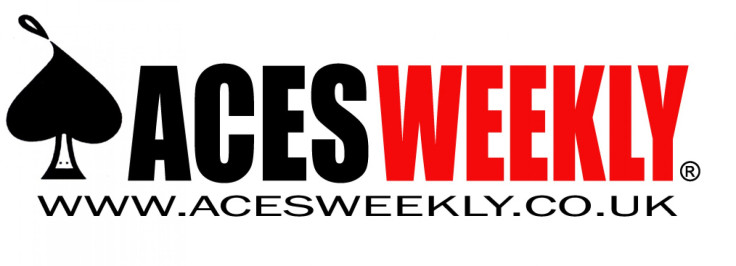
It has some of the best people in the business, and they’re all doing exactly what they want to do, and it’s all looking fantastic. Since we cut out those completely unnecessary costs of shipping and printing and all that stuff, we can do it at a very good price. We can supply 210 pages, which includes extras, pencils and inks, all sorts of stuff, to our subscribers for just $10.
And it’s tailored for the ratio of the computer screen as well as iPad, Android, laptop, all those devices access it through the website. You don’t have to go find a comic store or a book store, it’s just all of those things coming straight to you each week, as a kind of episodic serial. The past volumes you can buy separately, but it’s all just $10 for seven weeks.
And all in bright, bold color, too?
(Laughs). Some of it is in color. I can’t say all of it’s in color, because we say ‘do what you like,’ and some people like to work in black and white, so they do black and white. That would be an old traditional publisher’s thing, advertising "full color."
It’s a steal and I’ve done a lot of conventions. I was in Detroit a couple of weeks ago. We sell individual volumes soon. At conventions we do sketch cards which has a code on it which allows them to download a volume. We are going to be on Comixology [a mobile comic app] soon with complete volumes.
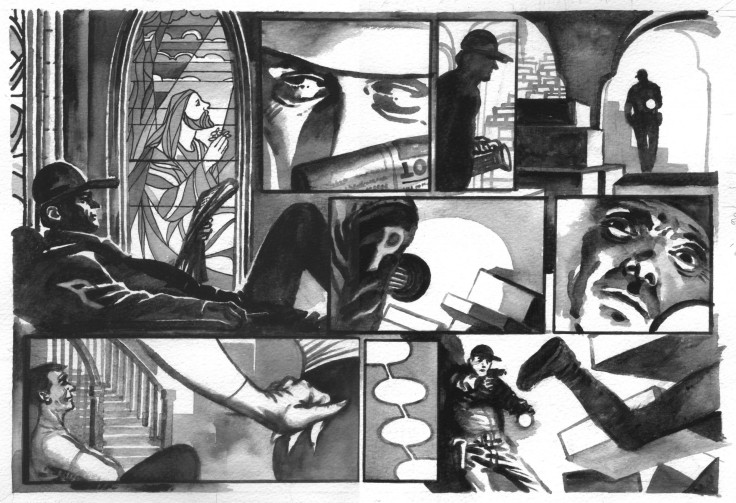
You just missed the “superstorm,” Hurricane Sandy, last time you came to New York.
I just missed that! I did just miss that, you’re right. (Laughs). I remember, exactly. I left just in time. I’m coming back to New York this year, and I’m also going to be in San Diego, as well.
Are the comic conventions a necessary evil, or do you enjoy doing them?
Conventions are fantastic, because you talk to people. Sitting at a drawing board all the time, or a computer, that’s no way to live your life, man. Conventions are great, they give you a chance to go out and meet the folks. With "Aces Weekly" especially, the on-site presence is very important.
It is very difficult to sell things online, and nobody seems to have cracked that nut, exactly. There is a resistance to moving from paper to digital in comics terms, also lots of stuff on the Internet, lots of comics on the Internet are free. But we offer the best quality at the best price, but if people expect stuff for free, it means the market is difficult. Having a physical presence, talking to people is very valuable. Even though, from a cost-effective point-of-view, of course it makes no sense.
It’s sounds sort of like the music industry, where artists really have to tour more to make money.
Absolutely. As long as it makes results, fine. The product is key, you want people to buy the product, but it's tough.
When I was in Detroit, I had lots of these sketch cards, and each card sells an individual volume [of "Aces Weekly"]. I have a laptop where I can actually show screenshots and the trailers and stuff, and that actually works. It works. You hope that people experiencing the individual volumes will think, "Well, now I would like an ongoing subscription." That’s what we need, that’s our lifeblood.
Let’s face it, we started in September of last year, the economy was not so good in either the U.S. or the U.K. We have rocky economies. I can’t say that we started at the same time. The $10 is for seven weeks, but we come out weekly.
We started this out in a very hard-headed manner, not in any kind of dream-like situation. But we were very optimistic, but that optimism did not prove justified. It is still a mystery. I think it’s a combination of comic fans being resistant moving from paper to screen. We all know the burgeoning market in iPads, we all know there is a massive shift in interest, but that shift is not fast enough.
Have you thought about going to print?
Our contributors join us knowing what the aims of "Aces Weekly" are, which is to make the most of our digital presence. If we go to print, it’s a compromise, there’s no need for us to compromise. We are living in a digital age. We might be a little it ahead of the times with "Aces Weekly," but paper is going to run out. No one is going to want it anymore.
The other great thing is, plug "Aces Weekly" in your plasma TV screen. It looks fantastic! Although the needs of the market means we have to chase the iPad, it looks brilliant on a large screen.
What was it like working with Hollywood? Was that enjoyable? What would you have done differently, looking back?
The only thing that I found very difficult, when I was doing that “Vendetta” junket stuff, is that I didn’t really know how to do an interview then. I was kind of new to it. I wish I could have that time over again, because I could have done a better job of it. I was very much a newbie, in that whole "being shoved in front of the camera" sense.
But from a personal point of view, it was a great experience meeting the cast and crew. It’s very interesting, you’re in sort of a rarified atmosphere. You’re going from one film premiere and one big hotel to another with Natalie Portman and John Hurt and Hugo Weaving, and you think, "Man, where am I?" But it was absolutely excellent.
And what struck me about it all, at the end of the day, was that everybody was professional. I was doing what I did as a professional, and they were doing what they did as a professional. And we were all in the same boat, selling this great story. But interacting with cameras and stuff, it was great training.
When did you actually sell the rights to “V For Vendetta”?
That was when we sold it DC, we owned the copyright up to that point. It was around about 1987, because before that, the series had been in hiatus. The magazine we appeared in had run out of money, so for a couple of years the series was incomplete. DC were happy to reprint the early work and continue that, but they wouldn’t do that unless they owned the rights. So we sold them the rights.
We got a percentage of the contract, but obviously had we known then what we know now, maybe we wouldn’t have. But if we had try to do it independently, or through another company, they probably wouldn’t have the reach that DC had. This is something that is not an exact science.
I am very happy with the results of what DC have done with it, and I have no complaints. I am trying to continue the tradition, of what led to V, with what we’re doing now, "Aces Weekly," in the spirit of creative freedom.
Follow David Lloyd and Aces Weekly on Twitter
© Copyright IBTimes 2024. All rights reserved.





















